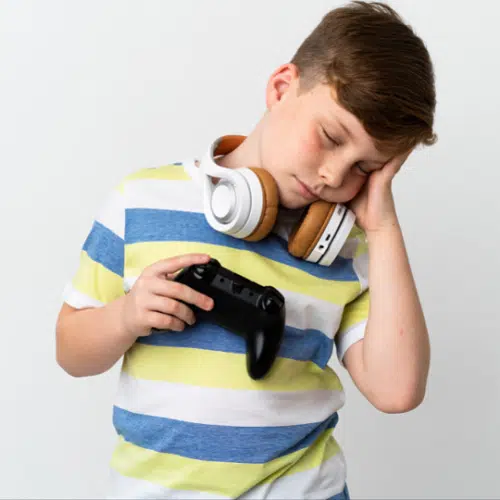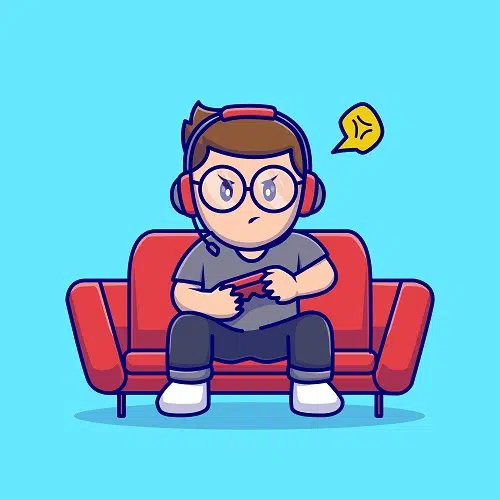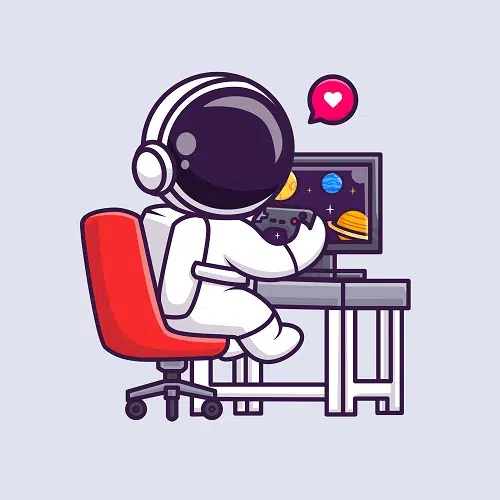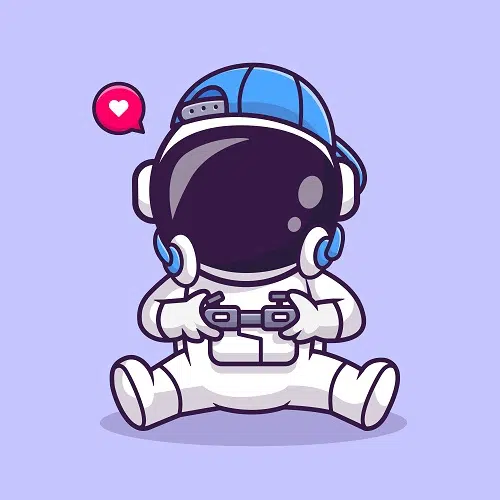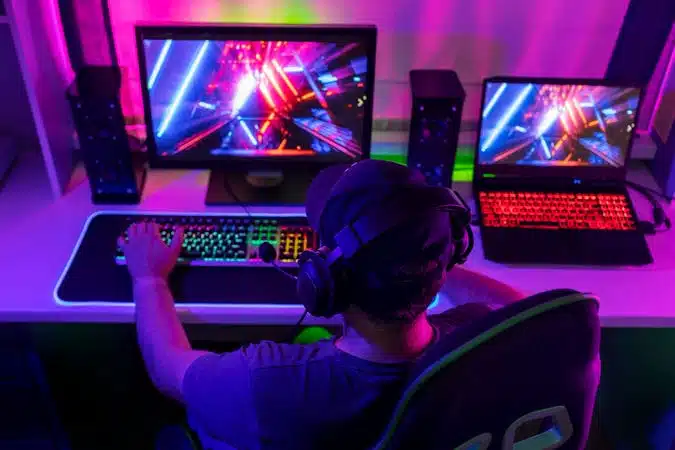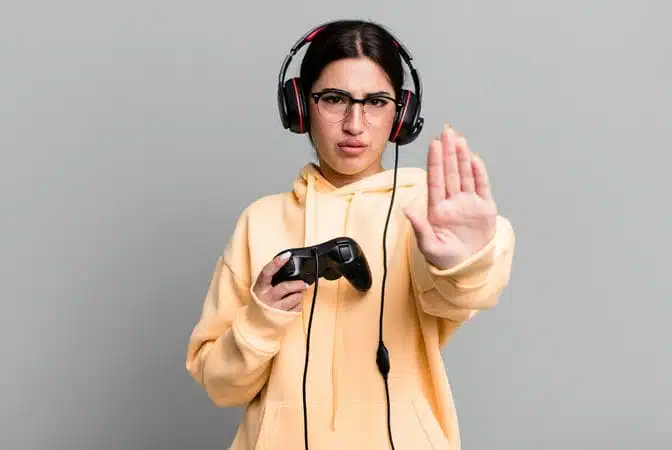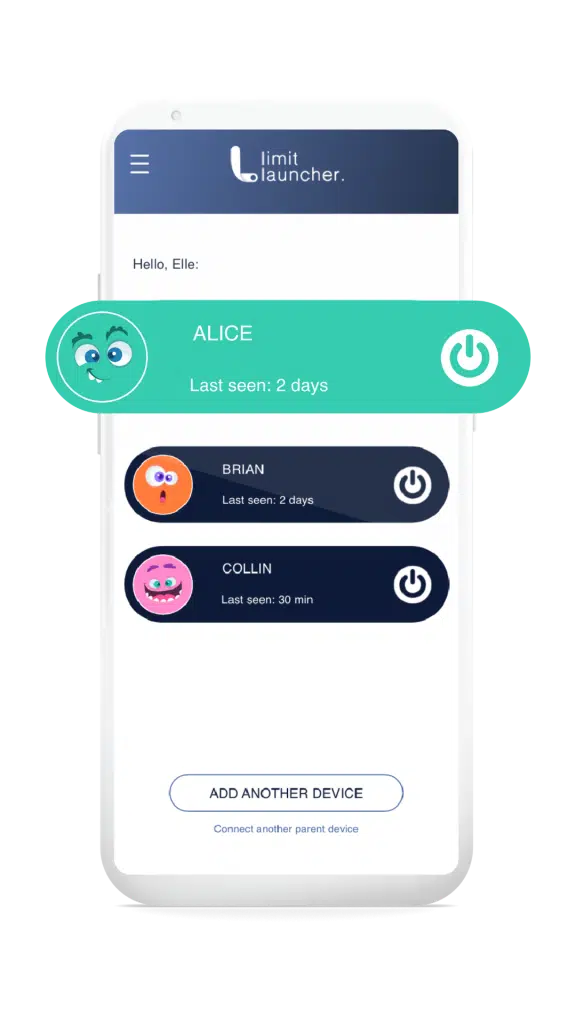As much as kids love playing video games, parents often dislike the amount of time some kids devote to it. In addition to the sheer amount of time a kid can waste on video games, many parents worry that they might cause or worsen attention issues. It’s important to understand the science behind video games and conditions like ADHD.
There is little to no evidence that video games cause or even worsen ADHD. However, current research indicates that people who have symptoms of ADHD play video games more often and for longer periods of time and are more likely to show signs of being addicted to video games.
Video games do have some benefits, but parents can and should be concerned about their kids developing an unhealthy relationship with video games. Keep reading to find out why kids who are diagnosed with, or show symptoms of, ADHD are more likely to play video games for hours on end, and how ADHD and video games are connected.

So Do Video Games Cause ADHD?
First, it’s very difficult to prove causal relationships between any two factors, so keep that in mind as we review the evidence for video games and their relationship with ADHD. There’s no evidence that video games cause ADHD; in fact, not much is known about what specifically causes ADHD at all.
Video games have been shown to have some benefits to kids, when played in moderation. These benefits can include:
● Improved hand-eye coordination
● Planning and critical thinking
● Visual-spatial acuity development
● Problem-solving skills
● Ability to compete and learn teamwork
While these are benefits to kids, these can be outweighed by the serious potential for a gaming disorder and the related negative consequences. Most things in life are fine when used in moderation, but video games are designed to be addictive so people want to keep playing them (and keep handing developers more money).
Kids with ADHD are more likely to play video games for longer periods of time, and to have a harder time breaking away from them. There are quite a few reasons for this, which we’ll discuss further on in this article.
Does screen time worsen ADHD?
According to a study published in JAMA Pediatrics, there is a correlation between screen time and ADHD symptoms. However, it is not clear whether screen time causes ADHD or whether children with ADHD are more likely to spend more time on screens.

What Is the Relationship Between ADHD and Video Games?
It can be extremely difficult to prove a causal relationship between two variables, especially with something as complex as ADHD and video games. Researchers still don’t fully understand ADHD, its causes, or how to successfully treat it without resorting to massive amounts of medication.
The reason a causal relationship is hard to prove is because kids and adults with ADHD might have a number of other factors in their lives that have led to the diagnosis, and these other factors could have come before or after their video game use. Also, there’s evidence that individuals with ADHD are drawn to video games instead of games causing the condition.
ADHD Can Make People Develop Unhealthy Relationships with Video Games
There is evidence to suggest that individuals who have been diagnosed with ADHD are more likely to develop an unhealthy relationship with video games than are people without the disorder. This is due to a variety of reasons, including:
● Video games have constant and rapid stimulation
● Individuals with ADHD are less likely to exhibit self-control
● Individuals with ADHD are sometimes able to hyperfocus on specific tasks or things
● Video games may provide a social outlet for kids unable to make friends in person
● Video games may provide “self-medication” by stimulating the release of dopamine
We’ll discuss each of these factors in a little more detail below.
Constant Stimulation
People with ADHD may have trouble concentrating on non-digital activities because their brains aren’t stimulated enough. Video games don’t have that issue, though. They are a constantly changing stimuli that is continuously offering new sights, sounds, and activities to players. This acts as a sort of “attention crutch” which makes being attentive less difficult.

Less Self-Control
Anyone with a child who has been diagnosed with ADHD is aware that these kids are much less able to exhibit self-control in most circumstances. This is primarily because their brain is unable to take a moment to pause and think through the risks and consequences of decision making.
This lack of self-control can manifest itself in any number of ways; individuals diagnosed with ADHD are more likely to become addicted to alcohol or other substances. This, unfortunately, also carries over to video games, where they show a similar lack of self-control.
Hyperfocus
One trait of individuals with ADHD is the ability to “hyperfocus” on specific tasks. ADHD isn’t necessarily the inability to focus on something, but rather the inability to regulate ones attention properly. Video games provide the stimulus necessary to cause individuals with ADHD to hyperfocus, often to the point that they’ll completely tune out the outside world for hours.
Some signs that your child is hyperfocused on video games may include the following:
● Lose track of time
● Don’t appear to hear you when you’re talking to them
● May have difficulty focusing on mundane or uninteresting tasks
It’s important to note that hyperfocus isn’t just a symptom of ADHD and it may not apply only to unproductive pursuits like video games. People could hyperfocus on pretty much anything that interests them, including sports, music, reading, or really any other pastime.

Social Outlet
Another unfortunate symptom of ADHD is an inability to socialize with peers in the real world. This can understandably create some real issues for kids who don’t necessarily understand why other kids their age don’t want to befriend them. Video games, particularly online games can be played with other people, provide a social outlet in something the person is good at.
Self-Medication
There is evidence that video gaming stimulates the brain to release dopamine, the feel-good chemical that, among other things, makes you want to keep getting more of it. Dopamine is also released when using drugs or alcohol, as well as from sex, music, or eating good food.
As you can imagine, high levels of dopamine release can be pleasurable and can become something anyone chases in the future. The brain is hard-wired to seek instant gratification, and a quick hit of dopamine makes it crave more. Kids who have an attention-deficit can help their brains focus (although they may not realize that’s what they’re doing).
How to Help Your Child Manage Video Game Time
While video games can have some benefits, playing them for too long leads to excessive gaming. This can have detrimental effects on a child’s physical and mental health. Not only that, but video games are unproductive and time spent on them can lead kids to lack meaningful social interaction, fall behind in school, or lose out on developing other skills and interests.
If your child has been diagnosed with ADHD and you’re starting to get concerned about the amount of video game playtime, you can try some of the following to help limit their time to a healthier amount:
● Establish clear rules and time limits
● Lock up video game consoles or controllers when not in use, or use a parental control tool.
● Help foster other potential interests (sports, hobbies)
● Pay attention to how much time your child is actually spending on video games. Learn more here!
● Compromise if your child isn’t lagging in other areas of their life
Video games as a treatment for ADHD
If you are looking for a fun and innovative way to help your child with ADHD, you might want to check out EndeavorRx. EndeavorRx is a video game that is being used as a treatment of ADHD. It has even been approved by the FDA. It is designed to improve attention function in children 8-12 years old with primarily inattentive or combined-type ADHD. By playing EndeavorRx, your child can strengthen their brain activity involved in focus and multitasking, while enjoying a colorful and creative game world. It can be played on a smartphone. EndeavorRx is not a substitute for medication or therapy. It can however be a valuable addition to your child’s therapeutic program. To learn more about EndeavorRx and how it can benefit your child, you can find their website here.

Closing Thoughts
Kids and adults with ADHD are especially vulnerable to video game addiction. Helping them manage their time spent on video games can be a difficult task. There is no evidence that video games cause ADHD. They may however make people with ADHD less attentive and shorten their attention spans in general.











